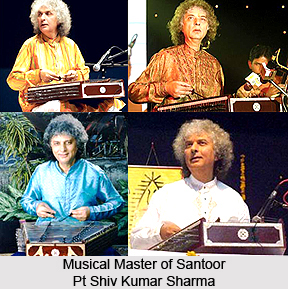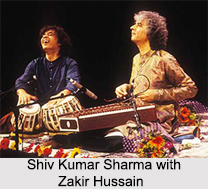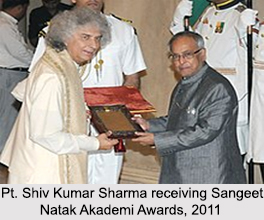 Pt. Shiv Kumar Sharma was born to an exceedingly musical family in the divine valley of Jammu and Kashmir. Trained under the rigorous tutelage of his talented father, Pt. Umadutt Sharma, Shiv Kumar naturally was inclined towards the details of musical instruments. However, during his boyhood, he was more passionate about the tabla and was ardent to pursue with it. But, with the insistence of his father, he was back in line on the unusual folk instrument, santoor. More than any one in the present times, it is Pt. Shiv Kumar Sharma, who has given form, substance and passion to Kinnara sangeet. No one has been able to distil the pristine beauty of a land and its people into a musical instrument as Shiv Kumar Sharma has done with santoor.
Pt. Shiv Kumar Sharma was born to an exceedingly musical family in the divine valley of Jammu and Kashmir. Trained under the rigorous tutelage of his talented father, Pt. Umadutt Sharma, Shiv Kumar naturally was inclined towards the details of musical instruments. However, during his boyhood, he was more passionate about the tabla and was ardent to pursue with it. But, with the insistence of his father, he was back in line on the unusual folk instrument, santoor. More than any one in the present times, it is Pt. Shiv Kumar Sharma, who has given form, substance and passion to Kinnara sangeet. No one has been able to distil the pristine beauty of a land and its people into a musical instrument as Shiv Kumar Sharma has done with santoor.
Early life of Pt. Shiv Kumar Sharma
Shiv Kumar Sharma was born on 13th January, 1938, in Jammu, into a Dogra Brahmin family. His father Pt. Umadutt Sharma was a renowned singer and tabla player who had received his training under Pt. Bade Ramdas of Beneras gharana. His job as the Chief Producer of Music with Jammu AIR gave him wide exposure to different varieties of music. Umadutt Sharma personally trained his son from the age of five in both vocal music and tabla. Shiv Kumar, however, was keener on the tabla in his boyhood and early youth than the santoor. Being deeply interested in both popular and rare musical instruments, Pt. Umadutt Sharma was drawn to satoor, swayed as he was by its lovely tone and musical possibilities. He wanted Shiv Kumar to take interest in the instrument and popularize it in whatever way he could. He also encouraged his son to distinguish himself academically alongside his practice in music. Shiv Kumar took degrees in English Literature and Economics, in order to widen his intellectual horizons. By now, he had become a proficient tabla player and accompanied many reputed singers and instrumentalists of his time.
 Early stages of Pt. Shiv Kumar"s career
Early stages of Pt. Shiv Kumar"s career
Soon however, as a result of his father`s persuasion, he took to the santoor, despite the fact that it was looked upon only as a folk instrument in the early 1950s. Shivkumar started learning santoor at the age of thirteen. He shifted to Bombay during the 1950s, following some promising offers from the film industry. He gave his first performance in Bombay in 1955. The audience, comprising of connoisseurs and critics, gibed at his attempts at transforming a folk instrument into a classical one. The battles he had to fight, the prejudices he had to face and the scorn he had to endure in the 1950s were numerous. At the concert in Bombay in 1955, the audience was compelled to acknowledge Shiv Kumar`s genius, and also the melodic potential of the santoor. It took Shiv Kumar another five years to perfect the instrument and make it truly concert-worthy. The 1960s and 1970s saw his ascent as one of the ace players in the country. The hard battle against prejudice and habit was won. At the instance of his daughter Madhura Jasraj, the legendary V. Shantaram gave the gifted and young Shiv Kumar an opening in the film Jhanak Jhanak Payal Baaje. Along with Hariprasad Chaurasia, he composed the background score for this highly successful movie venture. Shiv Kumar`s melodious chords struck chord in the minds of millions of music lovers at that time, and also thereafter.
Major Milestones in Pt. Shiv Kumar Sharma"s career
Pt. Shiv Kumar is credited with making santoor a popular classical instrument. After his first break in Shantaram"s movie, he recorded his first solo album in 1960. In 1967, he teamed up with Hariprasad Chaurasia and guitarist Brij Bhushan Kabra to produce an album, "Call of the Valley". It became one of Indian classical music`s greatest hits. He has also composed music for many Hindi films in collaboration with Hariprasad Chaurasia starting with Silsila in 1980. Some of the movies the Shiv-Hari duo composed music for, were big hits, such as Faasle (1985), Chandni (1989), Lamhe (1991), and Darr (1993). Shiv Kumar`s deep knowledge of vocal and instrumental genres helped him absorb the attractive features of Dhrupad-ang and Sitar-baaj. The alaap-jod-jhala pattern followed by sarod and sitar players was incorporated into his modified instrument. Those who had severe doubts about whether a folk instrument could take on the complexities required of the classical gharana, were flabbergasted when they heard Shiv Kumar deploy its characteristic features effortlessly. His mode of playing excellent melody, rhythm and rhythmic play, felicity and great skill is simply incomparable. In fact, he is one of the acknowledged contemporary masters of laya-kari.
Albums by Pt. Shiv Kumar Sharma
Shiv Kumar has innumerable albums and most has been made by teaming up with Hariprasad Chaurasia, or with Ustad Zakir Hussain. Some of his famous music albums are as follows:
•Santoor & Guitar, with Brij Bhushan (1964)
•Shivkumar Sharma (1967) - (re-released 2005 as "First LP Record of Pandit Shivkumar Sharma")
• Call of the Valley (1967)
•When Time Stood Still!, with Zakir Hussain(1982)
•Rag Madhuvanti & Rag Misra Tilang, with Zakir Hussain (1987)
•Ananda Bliss, with Zakir Hussain (2002)
•The Flow of Time, with Zakir Hussain (2002)
•Sympatico (Charukeshi - Santoor)(2004)
•The Inner Path (Kirvani - Santoor) (2004)
•Essential Evening Chants, with Hariprasad Chaurasia (2007)
 Awards received by Pt. Shiv Kumar Sharma
Awards received by Pt. Shiv Kumar Sharma
Shiv Kumar has received national and international awards, including an honorary citizenship of the city of Baltimore, USA, in 1985. He is the recipient of the Sangeet Natak Akademi Award in 1986. He was honoured with the Padma Shri in 1991 and the Padma Vibhushan in 2001. He has also received the Platinum Disc for the "Call of the Valley", Platinum Disc for music of "Silsila" and also for "Chandni", Gold Disc for the movie "Faasle", and the Pandit Chatur Lal Excellence Award – 2015.
Classical Ragas by Pt. Shiv Kumar Sharma
Shiv Kumar Sharma`s music possesses immense fluency and tuneful flicker. His alaaps are evocative, while his jods and jhalas are stimulating. His santoor indeed evokes unforgettable visual impressions associated with mountains, forests and rivers. When he plays Kalavati, one is barged with visions of a meandering river. When he plays the alaap of the Rageshri, one envisions the sun-kissed snow peaks glow. His Ahir Bhairav conjures the image of gleaming raindrops gently sliding off lotus petals. The sweet-sad mood of this early dawn raaga is hauntingly captured in his HMV recording. Shiv Kumar`s celebrated Kirwani stirs up feelings of humid melancholy. His live recording of Kaushi Kanada is a truly inspired piece. None can render Pahadi, with as much feeling and finish as Shiv Kumar Sharma.
Personal Life of Pt. Shiv Kumar Sharma
Pt. Shiv Kumar"s wife is Manorama. They have two sons. His son, Rahul Sharma, is also a santoor player and they have been performing together since 1996.
Today, if the santoor vibes with other time-honoured Indian instruments, on and off the national and international concert platforms, Shiv Kumar Sharma alone is the reason for it. His place in the galaxy of contemporary Indian instrumentalists is the same as that enjoyed by Ustad Amjad Ali Khan, Pandit Hariprasad Chaurasia and Zakir Hussain. Wherever he goes, Shiv Kumar Sharma evokes the refreshing scenic splendour of the valleys on his beloved santoor. He remains unequalled in his power to do so.




















